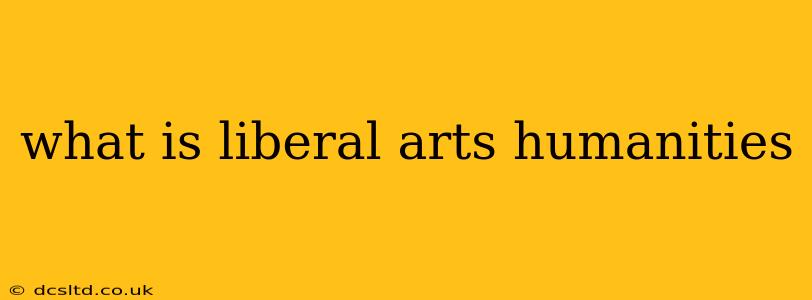The liberal arts humanities encompass a diverse range of disciplines focused on understanding the human experience, exploring cultural values, and developing critical thinking skills. It's more than just a collection of subjects; it's a holistic approach to education emphasizing critical analysis, creative expression, and effective communication. This isn't simply about memorizing facts; it's about developing a deeper understanding of ourselves, our societies, and the world around us.
What Subjects Fall Under Liberal Arts Humanities?
The liberal arts humanities typically include, but aren't limited to:
- Literature: Exploring novels, poetry, drama, and other forms of written expression to understand human emotions, social structures, and historical contexts.
- History: Studying past events and societies to gain perspective on the present, identifying patterns, and learning from past mistakes.
- Philosophy: Examining fundamental questions about existence, knowledge, values, reason, mind, and language. This involves critical thinking and logical argumentation.
- Languages: Learning different languages opens up new cultural perspectives and enhances communication skills, broadening understanding of diverse societies.
- Religious Studies: Studying various religions and belief systems to understand their impact on cultures and societies, fostering tolerance and understanding.
- Art History: Analyzing visual art forms throughout history to understand their cultural significance, artistic movements, and the evolution of aesthetic values.
- Music: Exploring the history, theory, and cultural significance of music across different genres and time periods.
- Theater: Engaging with dramatic performances, exploring storytelling, character development, and the power of theatrical expression.
What are the Benefits of Studying Liberal Arts Humanities?
The benefits extend far beyond the acquisition of specific knowledge. A strong foundation in the humanities fosters:
- Critical Thinking: Analyzing information objectively, identifying biases, and forming reasoned judgments are central skills honed through humanities studies.
- Communication Skills: Effective writing, speaking, and argumentation are essential for success in any field. Humanities courses emphasize these skills through essays, presentations, and discussions.
- Problem-Solving Abilities: The humanities encourage creative and analytical thinking, vital for tackling complex problems in any profession.
- Cultural Awareness: Exposure to diverse cultures and perspectives fosters empathy, tolerance, and a deeper understanding of the world.
- Adaptability and Innovation: The skills gained in the humanities—critical thinking, problem-solving, and communication—are highly transferable and valuable in a constantly changing world.
What Careers Benefit from a Liberal Arts Humanities Background?
While often perceived as solely leading to academic careers, a liberal arts humanities education provides a robust foundation for diverse professions:
- Journalism and Media: Strong writing and communication skills are essential for success in these fields.
- Law: Analytical thinking, research abilities, and argumentation skills developed in humanities are highly valued.
- Politics and Public Service: Understanding history, social structures, and ethical considerations are critical.
- Business and Management: Critical thinking, communication, and problem-solving skills are vital for leadership roles.
- Non-profit Organizations: Empathy, cultural awareness, and communication skills are crucial for working with diverse communities.
How Does Liberal Arts Humanities Differ from STEM?
While STEM (Science, Technology, Engineering, and Mathematics) focuses on scientific and technical skills, the humanities concentrate on human culture, values, and critical thinking. These fields are not mutually exclusive; in fact, a combined approach often leads to more well-rounded and innovative individuals. The humanities provide a crucial counterpoint to the often-quantitative nature of STEM fields, fostering creativity, ethical considerations, and a nuanced understanding of societal impact.
Is a Liberal Arts Humanities Degree Worth It?
Absolutely. While the immediate financial returns might not always be as apparent as with some STEM fields, the long-term benefits in terms of critical thinking, communication, and adaptability are immeasurable. In a rapidly changing world, the ability to analyze, adapt, and communicate effectively is paramount, and a strong liberal arts humanities foundation provides precisely these skills. The value of a liberal arts education lies not just in the job it gets you, but in the person it helps you become.
What are Some Common Misconceptions About Liberal Arts Humanities?
A frequent misconception is that humanities degrees lack practicality. This is demonstrably false. The transferable skills gained, such as critical thinking, communication, and problem-solving, are highly valued across various industries. Another misconception is that it is solely an academic pursuit. While many continue to academia, many others use these skills in diverse professions.
This comprehensive overview hopefully clarifies the essence of liberal arts humanities and its enduring value in personal and professional development. It's an investment in understanding humanity and equipping oneself with valuable lifelong skills.
